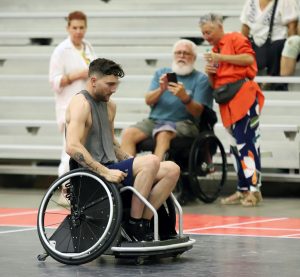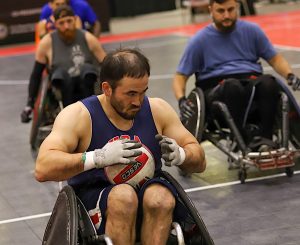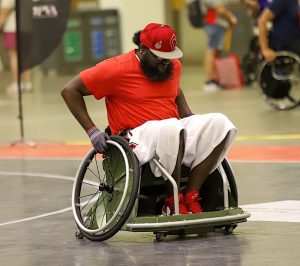Wheelchair rugby clinic taught by a handful of high-profile athletes
As he wheeled up to the 44th National Veterans Wheelchair Games’ (NVWG) wheelchair rugby clinic Thursday afternoon, Austin Walters didn’t have a key item — a sports chair.

No worries. Lots of people helped the Paralyzed Veterans of America (PVA) Keystone Chapter member borrow one inside the Minneapolis Convention Center.
First, the 27-year-old Army veteran tested a prototype wheelchair from Human Engineering Research Laboratories while doing passing and mobility drills. Then, a female athlete let him use her sports wheelchair and some strap-in belts to compete in a scrimmage. Turns out, the athlete was U.S. Paralympian and national wheelchair rugby team member Sarah Adam — and Walters didn’t know until way later.
He was stunned.
“And she set me up with the whole setup to go out and play. So, without her, I wouldn’t have been able to play,” Walters says. “She really helped me out.”
In a first at the Games, co-sponsored by the Department of Veterans Affairs and PVA, U.S. wheelchair rugby national members and coaches joined up to help lead a clinic, fresh off the team’s 61-47 gold-medal-winning World Wheelchair Rugby Americas Championship title over tournament host Brazil in Sao Paolo just two days before. It was the first time the final of the Americas Cup wasn’t the United States vs. Canada, with Brazil upsetting the Canadiens, 57-47, in the semifinals.
U.S. national team head coach Joe Delagrave, assistant coach Eric Newby and players Chuck Aoki, Sarah Adam and Mason Symons helped guide a two-hour-long clinic inside the convention center. They talked to about 15 athletes, taught them some pre-clinic warmup stretches and performed a handful of passing and chair movement drills before participating in a scrimmage.

Aoki says PVA leaders approached some U.S. national wheelchair rugby team coaches and athletes during the PVA Rugby Invitational in February in Louisville, Ky., about coming to the Games and putting on a clinic. They obliged, despite the quick turnaround from Brazil.
Although Aoki isn’t a veteran, he acknowledges the community is welcoming and enjoys working with athletes of different ages, ability levels and experience.
“And, you know, I tell people all the time that you don’t have to be a Paralympic athlete to have the sport impact your life. And so, I think this is a great example of how it can impact your life in a really positive way, even if it’s only just you come here and play every year is all,” says Aoki, who, along with Adam, were named to the Americas Championship all-tournament team.

It changed the start of the day for Terrence Graves-Hughley. The 47-year-old Air Force veteran and PVA Buckeye Chapter member has a level C3-C7 spinal cord injury (SCI) sustained in 2017. On the day before his birthday and first-year anniversary with his wife, Cynthia, he broke his back at the gym while powerlifting.
He also tested out the prototype wheelchair rugby chair, which was inspired by the Japanese art form Kirigami, and liked it before he borrowed another sports wheelchair to use for the scrimmage.
This year marked Graves-Hughley’s third straight NVWG. A Cleveland resident, he’d only wheeled past wheelchair rugby each of the last two years, not thinking he could do it. But one of his physical therapists changed his mind this year, telling him he should give it a try because he does powerlifting and has upper body strength, too.
“So, this year, I wanted to give it a try. I need to practice anyway. And I love it, man. I’m most definitely gonna sign up for it,” says Graves-Hughley, who is also competing in powerlifting, cornhole, disc golf, boccia and 9-ball billiards. “You can use your strength. It’s just like football, man. Control. You control yourself, OK? Once you get the ball, you will control everything, man. And I like the attention you get. Everybody looking at you.”

A Pittsburgh resident, Walters says his experience was phenomenal, too.
“I can’t believe the amount of support and the knowledge that these guys have. The level of ability that they have, it opens me up to a whole new perspective of where I can be,” says Walters, who served as a combat engineer and sustained a level C6-C7 SCI in a 2020 motorcycle accident in Nashville, Tenn.
But just as important is the camaraderie and family the sport gives him.
“I’m the only guy I see on a daily basis like me, you know? So, coming here and seeing everybody and knowing that there’s people out there and that there’s a support and family, that’s good. It’s very inspiring and uplifting for sure. I’ve had a smile on my face since I’ve been here, man,” Walters says.
Adam sees his promise.
An occupational therapist at St. Louis University in Missouri, Adam says she likes helping others and get people acclimated to seating, especially with wheelchair rugby chairs. She was diagnosed with multiple sclerosis (MS) in 2016 while in graduate school and understands how much of a challenge it can be.
“Initially, we were trying to fill out his chair setup and what he needed to be able to use his function. And bso, it took a minute to dial that in, but you could see him progressing,” Adam says. “Actually, he kind of has an athletic mind out there, making some good reads on the court, going for the pick and rolls, wanting the ball, being aggressive, which is exactly what we love seeing. Just jump right in.”
